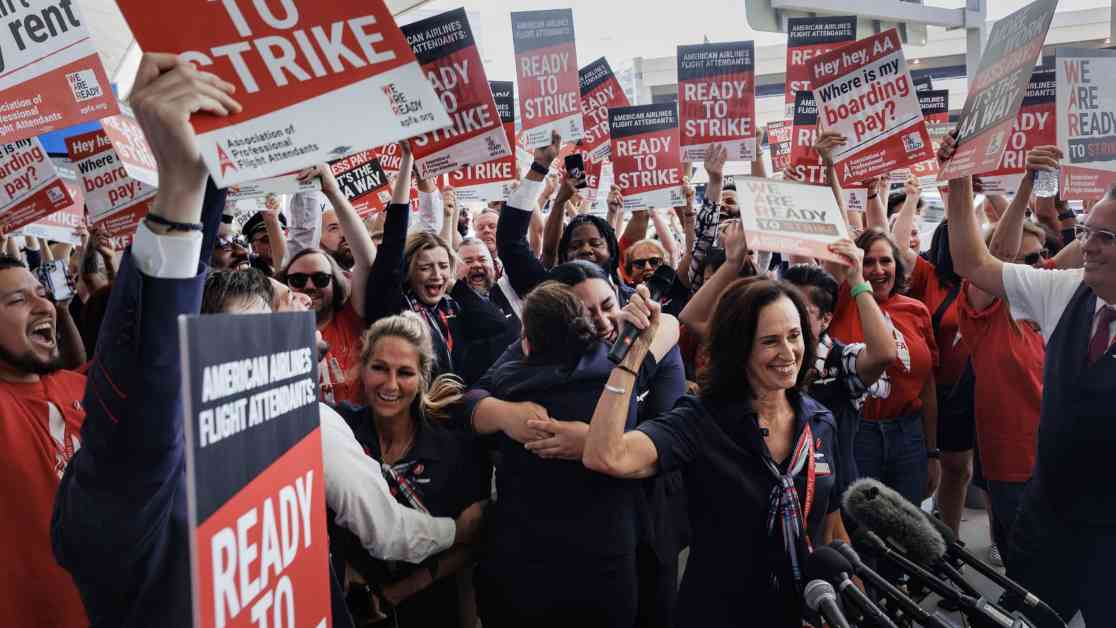American Airlines Flight Attendants Ratify Contract with 20%+ Immediate Raises
American Airlines flight attendants have officially ratified a new five-year labor deal, bringing an end to a tumultuous period of negotiations and providing significant raises for cabin crews. The contract, approved by 87% of the flight attendants who voted, includes immediate wage increases of up to 20.5%, starting in October.
Significant Milestone for Flight Attendants
Julie Hedrick, president of the Association of Professional Flight Attendants, expressed her satisfaction with the new contract, stating, “This contract marks a significant milestone for our Flight Attendants, providing immediate wage increases of up to 20.5%, along with significant retroactive pay to address time spent negotiating.” The Association represents around 28,000 cabin crew members, making them the largest unionized work group at American Airlines.
Relief for American Airlines
The successful negotiation of this contract comes as a relief for American Airlines’ leadership, who had faced the looming threat of a strike by flight attendants if an agreement could not be reached. Transportation Secretary Pete Buttigieg and Labor Secretary Julie Su were involved in the negotiations, overseen by the National Mediation Board. The pressure was also on from over 160 lawmakers urging the NMB to facilitate deals across the airline industry.
Celebration of Achievement
American Airlines CEO Robert Isom celebrated the achievement, stating, “Reaching an agreement for our flight attendants has been a top priority, and today, we celebrate achieving this important milestone.” The new contract not only addresses wage increases but also aims to improve work conditions for flight attendants, aligning with their demands for higher pay and better work rules.
Industry-Wide Trends
The push for higher pay and improved working conditions among airline workers is not unique to American Airlines. United Airlines is still in negotiations with its flight attendants’ union for a new contract, while Alaska Airlines recently saw its cabin crew members reject a tentative labor deal. The disruptions caused by the Covid-19 pandemic and the subsequent rise in the cost of living have fueled these demands for better compensation and benefits.
Broader Impact on Labor Negotiations
The trend of demanding higher pay in labor negotiations extends beyond the airline industry. Other sectors, such as the auto industry and Hollywood, have seen workers successfully secure better contracts, often after engaging in strikes or other forms of collective action. The ongoing negotiations at Boeing, where 33,000 workers are voting on a new contract with 25% raises, reflect the broader movement towards fairer compensation for employees.
Challenges and Opportunities
While the approval of the new contract is a significant win for American Airlines flight attendants, challenges remain in the labor landscape. Boeing workers are currently voting on a new contract with substantial raises, with the possibility of a strike looming if the deal is rejected. Balancing the needs of employees with the financial realities of the company poses a delicate challenge for both management and labor representatives.
Looking Ahead
As the labor market continues to evolve, it is essential for companies to prioritize fair compensation and equitable working conditions for their employees. The successful negotiation of the contract between American Airlines and its flight attendants sets a positive example for the industry, demonstrating that mutually beneficial agreements can be reached through thoughtful dialogue and compromise.
In Conclusion
The ratification of the new contract by American Airlines flight attendants represents a significant victory for labor rights and fair compensation in the airline industry. By addressing the demands of cabin crews for higher pay and better working conditions, the agreement sets a positive precedent for future negotiations within the sector. As the aviation industry navigates the challenges of a post-pandemic world, prioritizing the well-being of employees will be crucial in ensuring a sustainable and thriving workforce.






















